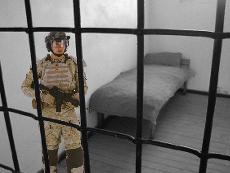Aggravated assault is an unlawful attack when the offender intentionally causes injury and bodily harm with or without a weapon and with no regard to the victim. Aggravated assault includes the intent to kill, rob or rape. Most people would like to see attempted rapists and murderers serving time. Instead, they are being offered the opportunity to serve in the army.
Recently, the number of so called “moral waivers,” waivers which allow known criminals to serve in the army, have increased. Approved waivers for people convicted of both felonies and misdemeanors have increased since 2006, according to The New York Times.
According to The New York Times, “Fewer than 3 in 10 people ages 17 to 24 are fully qualified to join the Army.”
“The data is crystal clear; our armed forces are under incredible strain, and the only way that they can fill their recruiting quotas is by lowering their standards,” said Rep. Martin T. Meehan, Democrat of Massachusetts and chairman of the House Armed Services Subcommittee on Investigations and Oversight, to The New York Times.
Sophomore Emily Febiger feels that recruiting criminals does not reflect on the army well.
“It seems like the wrong thing to do,” Febiger said. “Giving a gun to someone with a criminal record and (who) has used a gun violently in the past seems dangerous.”
The New York Times reported that Meehan holds these beliefs as well.
“We are endangering the rest of our armed forces and sending the wrong message to potential recruits across the country,” Meehan said of allowing criminals into the army.
Sophomore Kat Siladi isn’t surprised by the number of criminals in the army.
“It seems that a criminal would join because of limited job opportunities,” Siladi said.
Indeed, The New York Times reports that criminals often do turn to the military because of limited job offerings due to criminal records.
Siladi isn’t shocked by the increase in moral waivers being offered either.
“It makes sense. I once met a woman who was in the army and she told me that they break you down and build you back up into a machine. It just seems as if people who commit crime are just closer to becoming such a machine,” Siladi said.
The increase in allowing criminals calls into question some of the military’s practices, in particular their “don’t ask, don’t tell” stance on homosexuality.
“That’s just ridiculous, giving jobs and guns to criminals when a person who happens to be gay is willing to take that job makes no sense,” Febiger said.
Aaron Belkin, director of the Michael D. Palm Center, an institution which researches the army’s “don’t ask, don’t tell” policy, also believes this situation is ridiculous and dangerous.
“The chance that one of those individuals is going to commit an atrocity or disobey an order is higher,” Belkin told The New York Times.
Sophomore Saron Smith-Hardin thinks that the increase in criminals allows people who might have attempted murder as a civilian the chance to kill in an environment where it is deemed acceptable.
“My main concern is that some of these people have attempted murder. However, in the army you are expected to kill, particularly during a war,” Smith-Hardin said.
On the other hand, joining the army might have positive affects on convicted criminals.
“It’s possible that there might be benefits for the criminals who join. Going into the army teaches and reinforces discipline,” said Febiger.
Still, there are risks involved.
John D. Hutson, dean and president of the Franklin Pierce Law Center, said to The New York Times, “If you are recruiting somebody who has demonstrated some sort of antisocial behavior and then you are a putting a gun in their hands, you have to be awfully careful about what you are doing.

